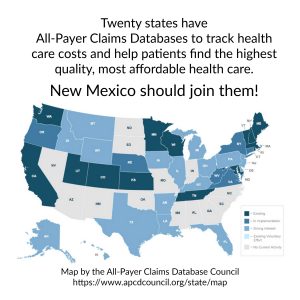 Looking for the perfect holiday gift? Check out Think New Mexico’s new online store at Threadless, where you can find shirts, mugs, cell phone cases, water bottles, stickers, bags and more! Wear your support for nonpartisan public policy reform on your sleeve, and share it with your friends.
Looking for the perfect holiday gift? Check out Think New Mexico’s new online store at Threadless, where you can find shirts, mugs, cell phone cases, water bottles, stickers, bags and more! Wear your support for nonpartisan public policy reform on your sleeve, and share it with your friends.
You can also make a donation to Think New Mexico in honor of a loved one. We will send them an acknowledgement letter and list them in our annual report, and we have a gift card you can print out for them as well.
 In 2018, New Mexico took a first step toward making health care prices more transparent with the launch of a website, nmhealthcarecompare.com, where anyone can find the average prices paid by Medicaid for nine common, non-emergency procedures at each of the state’s 44 hospitals. The website, which was created as a result of legislation that Think New Mexico drafted and advocated for, also includes quality metrics for the hospitals, such as 30-day readmission rates and patient ratings.
In 2018, New Mexico took a first step toward making health care prices more transparent with the launch of a website, nmhealthcarecompare.com, where anyone can find the average prices paid by Medicaid for nine common, non-emergency procedures at each of the state’s 44 hospitals. The website, which was created as a result of legislation that Think New Mexico drafted and advocated for, also includes quality metrics for the hospitals, such as 30-day readmission rates and patient ratings.
Now it is time to take the next step: adding the average prices paid by New Mexicans who are covered by individual or employer-provided insurance policies. A growing number of other states, including our neighbors in Colorado and Utah, are pulling back the veil on health care prices by creating All-Payer Claims Databases (APCDs), which collect information on the prices paid for health care by all payers and allow those states to provide information about the average costs of care for people with different types of insurance.
During the 2019 legislative session, Think New Mexico will be advocating for New Mexico to create an APCD to make health care prices more transparent and empower New Mexicans to find the most affordable, highest quality health care. Read our guest editorial and learn more about this initiative!
 While the recent Yazzie/Martinez v. State of New Mexico decision has understandably received intense interest for its landmark ruling that New Mexico’s public schools are not adequately funded, there has been less attention on another, equally important aspect of the ruling: the finding that more money will only make a difference for students if it is spent in the classroom.
While the recent Yazzie/Martinez v. State of New Mexico decision has understandably received intense interest for its landmark ruling that New Mexico’s public schools are not adequately funded, there has been less attention on another, equally important aspect of the ruling: the finding that more money will only make a difference for students if it is spent in the classroom.
Read Think New Mexico’s recent opinion editorial about how and why we must make sure that every additional dollar appropriated in response to the Yazzie decision is spent in the classroom!
 Read all about the latest progress on our efforts to maximize dollars to the classroom, fight the food tax, increase funding for lottery scholarships and much more in Think New Mexico’s latest annual report! Click here to download the annual report.
Read all about the latest progress on our efforts to maximize dollars to the classroom, fight the food tax, increase funding for lottery scholarships and much more in Think New Mexico’s latest annual report! Click here to download the annual report.
We are delighted to be joined this summer by Mitchel Latimer, a Roswell native majoring in Political Science and Economics at the University of Denver; EmmaLia Mariner, who grew up in Albuquerque and is studying Politics and Law and Society at Oberlin College; Elena Purcell, an Albuquerque native and a senior at Wellesley majoring in Economics and Spanish; and Neel Roy, who grew up in Albuquerque and is now a rising senior at Texas Tech University! Mitchel and EmmaLia are working with us June-July, and Elena and Neel will be here July-August.
 In 2005, Think New Mexico won passage of legislation creating a Strategic Water Reserve, a pool of publicly-held water rights dedicated to keeping New Mexico’s rivers flowing to avoid lawsuits over endangered species and interstate compacts. With the current drought and Texas’ lawsuit against New Mexico over the lower Rio Grande, we need this water management tool now more than ever – yet its effectiveness has been hampered by a lack of funding.
In 2005, Think New Mexico won passage of legislation creating a Strategic Water Reserve, a pool of publicly-held water rights dedicated to keeping New Mexico’s rivers flowing to avoid lawsuits over endangered species and interstate compacts. With the current drought and Texas’ lawsuit against New Mexico over the lower Rio Grande, we need this water management tool now more than ever – yet its effectiveness has been hampered by a lack of funding.
Read about how the Strategic Water Reserve can benefit New Mexico communities in our recent opinion editorial and learn more about this ongoing initiative.
 In the wake of several school shootings, New Mexico lawmakers included $40 million for improving school safety in this year’s state budget, to pay for security features like metal detectors, surveillance cameras, and bulletproof windows.
In the wake of several school shootings, New Mexico lawmakers included $40 million for improving school safety in this year’s state budget, to pay for security features like metal detectors, surveillance cameras, and bulletproof windows.
Think New Mexico encourages lawmakers to also consider what they might do about a surprising and often overlooked factor in school shootings: they are disproportionately concentrated in large schools. Read our op-ed about how smaller schools tend to be safer and learn more about our small schools initiative.
 On the afternoon of February 10, 2018, something remarkable happened in the New Mexico House: the bill that was introduced to benefit the lottery’s special interest vendors was transformed into a bill that puts students first.
On the afternoon of February 10, 2018, something remarkable happened in the New Mexico House: the bill that was introduced to benefit the lottery’s special interest vendors was transformed into a bill that puts students first.
House Bill 147 was originally introduced to repeal the requirement that the lottery deliver at least 30% of revenues to the scholarship fund. It reached the House floor on an 8-6 “no recommendation” vote after twice failing to pass the House Appropriations and Finance Committee. Think New Mexico opposed the bill as it was originally introduced.
Anticipating that the bill would make it to a vote of the full House, Think New Mexico drafted three amendments to protect the interests of students. Thanks to leadership from legislators across the political spectrum, all three amendments were successfully added to the bill. You can read an excellent overview of what happened by the Santa Fe New Mexican’s Steve Terrell.
First, Representative Jason Harper (R-Rio Rancho) passed an amendment that would caps the lottery’s annual operating costs at 15%. This is the average amount the lottery has spent on operating costs, including its contracts with multinational gaming corporations, for the past decade. However, before the lottery was required to deliver at least 30% to scholarships, it spent upwards of 20% on its operating costs.
Then, Representative Matt McQueen (D-Santa Fe) passed an amendment to increase the annual guarantee for students from $38 million to $40 million a year. The scholarship fund has received at least $40 million a year in nine of the last ten years.
Finally, Representative Alonzo Baldonado (R-Los Lunas) passed an amendment requiring that any unclaimed prizes must go to the scholarship fund in addition to the $40 million floor. Unclaimed prizes average $1-3 million a year.
Thanks to these amendments, House Bill 147 guaranteed that students would receive at least $40 million a year, plus $1-3 million in unclaimed prizes, and if the lottery ever failed to deliver that amount, the 30% guarantee would automatically return. In addition, lottery operating costs would be capped at the current level so that any growth in the lottery will go to students, not gaming companies.
Our bottom line has consistently been that any changes to the lottery must put the interests of students first, since the purpose of the lottery is to maximize revenues for scholarships. We are very pleased that House Bill 147 now passes that test.
We are now urging the Senate to join the House and pass the bill in its amended form. You can help us by emailing your legislators and urge them to pass lottery legislation that puts students first!
 During the 2018 legislative session, Senator Cliff Pirtle has introduced Senate Bill 129, which would reimpose the food tax on all groceries other than meat, flour tortillas, and items eligible for WIC, the Women, Infants, and Children supplemental nutrition program.
During the 2018 legislative session, Senator Cliff Pirtle has introduced Senate Bill 129, which would reimpose the food tax on all groceries other than meat, flour tortillas, and items eligible for WIC, the Women, Infants, and Children supplemental nutrition program.
We sent Senator Pirtle a letter (read it here) explaining how unworkable this would be. WIC excludes many locally produced foods, like goat cheese, chile powder, and all nuts, including New Mexico pecans and pistachios. Moreover, even for items that are potentially WIC-eligible, only specific brands and specific sizes of foods are included in the program.
WIC recipients have to bring a 17-page booklet to the grocery store with them to keep track of which foods are covered by the program – imagine every New Mexico family having to do the same to find out which foods are taxed!
Please email your legislators and the governor and urge them to take the food tax off the table!
 A bipartisan team of legislators, including five educators and the Democratic Chair and ranking Republican on the House Appropriations and Finance Committee, have introduced House Bill 180 to move more than $100 million a year from school district central administrative offices to New Mexico’s classrooms. Moving these dollars to the classroom will make more money available for critical needs like addressing the statewide teacher shortage and expanding access to proven programs like early childhood education and K-3 Plus.
A bipartisan team of legislators, including five educators and the Democratic Chair and ranking Republican on the House Appropriations and Finance Committee, have introduced House Bill 180 to move more than $100 million a year from school district central administrative offices to New Mexico’s classrooms. Moving these dollars to the classroom will make more money available for critical needs like addressing the statewide teacher shortage and expanding access to proven programs like early childhood education and K-3 Plus.
The bill, which is based on Think New Mexico’s 2017 policy report, sets ambitious but achievable targets for school districts and charter schools to maximize the percentage of their budgets that they are spending in the classroom. The targets are voluntary, but the bill provides an incentive for districts and charters that meet the classroom spending targets, and it helps them get there by reducing unnecessary administrative paperwork.
Read more about the details of Think New Mexico’s proposals, and contact your legislators and the governor and ask them to support these important reforms!
 Looking for the perfect holiday gift? Check out Think New Mexico’s new online store at Threadless, where you can find shirts, mugs, cell phone cases, water bottles, stickers, bags and more! Wear your support for nonpartisan public policy reform on your sleeve, and share it with your friends.
Looking for the perfect holiday gift? Check out Think New Mexico’s new online store at Threadless, where you can find shirts, mugs, cell phone cases, water bottles, stickers, bags and more! Wear your support for nonpartisan public policy reform on your sleeve, and share it with your friends.
 In 2018, New Mexico took a first step toward making health care prices more transparent with the launch of a website,
In 2018, New Mexico took a first step toward making health care prices more transparent with the launch of a website,  While the recent Yazzie/Martinez v. State of New Mexico decision has understandably received intense interest for its landmark ruling that New Mexico’s public schools are not adequately funded, there has been less attention on another, equally important aspect of the ruling: the finding that more money will only make a difference for students if it is spent in the classroom.
While the recent Yazzie/Martinez v. State of New Mexico decision has understandably received intense interest for its landmark ruling that New Mexico’s public schools are not adequately funded, there has been less attention on another, equally important aspect of the ruling: the finding that more money will only make a difference for students if it is spent in the classroom. Read all about the latest progress on our efforts to maximize dollars to the classroom, fight the food tax, increase funding for lottery scholarships and much more in Think New Mexico’s latest annual report!
Read all about the latest progress on our efforts to maximize dollars to the classroom, fight the food tax, increase funding for lottery scholarships and much more in Think New Mexico’s latest annual report! 



 In 2005, Think New Mexico won passage of legislation creating a Strategic Water Reserve, a pool of publicly-held water rights dedicated to keeping New Mexico’s rivers flowing to avoid lawsuits over endangered species and interstate compacts. With the current drought and Texas’ lawsuit against New Mexico over the lower Rio Grande, we need this water management tool now more than ever – yet its effectiveness has been hampered by a lack of funding.
In 2005, Think New Mexico won passage of legislation creating a Strategic Water Reserve, a pool of publicly-held water rights dedicated to keeping New Mexico’s rivers flowing to avoid lawsuits over endangered species and interstate compacts. With the current drought and Texas’ lawsuit against New Mexico over the lower Rio Grande, we need this water management tool now more than ever – yet its effectiveness has been hampered by a lack of funding. In the wake of several school shootings, New Mexico lawmakers included $40 million for improving school safety in this year’s state budget, to pay for security features like metal detectors, surveillance cameras, and bulletproof windows.
In the wake of several school shootings, New Mexico lawmakers included $40 million for improving school safety in this year’s state budget, to pay for security features like metal detectors, surveillance cameras, and bulletproof windows. On the afternoon of February 10, 2018, something remarkable happened in the New Mexico House: the bill that was introduced to benefit the lottery’s special interest vendors was transformed into a bill that puts students first.
On the afternoon of February 10, 2018, something remarkable happened in the New Mexico House: the bill that was introduced to benefit the lottery’s special interest vendors was transformed into a bill that puts students first. During the 2018 legislative session,
During the 2018 legislative session,  A bipartisan team of legislators, including five educators and the Democratic Chair and ranking Republican on the House Appropriations and Finance Committee, have introduced House Bill 180 to move more than $100 million a year from school district central administrative offices to New Mexico’s classrooms. Moving these dollars to the classroom will make more money available for critical needs like addressing the statewide teacher shortage and expanding access to proven programs like early childhood education and K-3 Plus.
A bipartisan team of legislators, including five educators and the Democratic Chair and ranking Republican on the House Appropriations and Finance Committee, have introduced House Bill 180 to move more than $100 million a year from school district central administrative offices to New Mexico’s classrooms. Moving these dollars to the classroom will make more money available for critical needs like addressing the statewide teacher shortage and expanding access to proven programs like early childhood education and K-3 Plus.